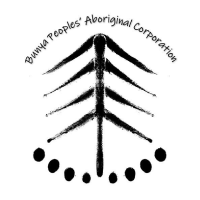Fire Practice
Fire is known by many terms and in many languages. Cultural fire describes practices used by Aboriginal people to enhance the health of land and its people. Cultural fire means different things to different people. It is ceremony to welcome people to country or is as simple as a campfire around which people gather to share, learn, and celebrate. It can include burning (or preventing burning) for the health of particular cultural values, people, plants, animals and places.
Country tells us when to burn. There are indicators that inform us that cultural protocols are being followed when burning country. For example, it is lore that the canopy of gum country is always protected. The canopy should have no signs of damage or scorch marks and low fire scars on tree base.
By reading country, we are looking for an increase in cover and diversity of grasses and micro plants, and Gum tree reproduction in forest areas (new generations). We are also looking for an increase in key native fauna presence. We need to be on country regularly and always reading country to know what actions are required, and if these actions are working.
Being able to see through and move through gum country and grasslands, following cultural pathways maintained through the ages by fire, is another indicator of the health of the country. Blanket management does not work or align with the Aboriginal cultural practice of caring for country. Country determines the management approach.
Fire is known by many terms and in many languages. Cultural fire describes practices used by Aboriginal people to enhance the health of land and its people. Cultural fire means different things to different people. It is ceremony to welcome people to country or is as simple as a campfire around which people gather to share, learn, and celebrate. It can include burning (or preventing burning) for the health of particular cultural values, people, plants, animals and places.
Country tells us when to burn. There are indicators that inform us that cultural protocols are being followed when burning country. For example, it is lore that the canopy of gum country is always protected. The canopy should have no signs of damage or scorch marks and low fire scars on tree base.
By reading country, we are looking for an increase in cover and diversity of grasses and micro plants, and Gum tree reproduction in forest areas (new generations). We are also looking for an increase in key native fauna presence. We need to be on country regularly and always reading country to know what actions are required, and if these actions are working.
Being able to see through and move through gum country and grasslands, following cultural pathways maintained through the ages by fire, is another indicator of the health of the country. Blanket management does not work or align with the Aboriginal cultural practice of caring for country. Country determines the management approach.
Managing Invasive Species
Invasive plants and animals have a significant impact to the health of country. Invasive species include exotic plants, ‘invasive native’ plants, and feral animals. Examples of BPAC Ranger activities to manage invasive species includes:
- Managing Acacia infestations in the Bunya grassland balds.
- Managing privet in dry rainforest in Redwood Park.
- Feral pig management at St Ruth’s Reserve and Russell Park.
- Tree pear management at Cattle Creek.
Reviving & Sharing Knowledge
Key to healing country is reviving and sharing knowledge of country. The BPAC Ranger program strives to do this through the following activities:
- School-based Aboriginal Conservation and Land Management trainees
- Bunya Aboriginal community network workshops and meetings
- Fire practitioner workshops and programs
- Bonye Biar Bush University education and tourism program.
- School-based Aboriginal Conservation and Land Management trainees
- Bunya Aboriginal community network workshops and meetings
- Fire practitioner workshops and programs
- Bonye Biar Bush University education and tourism program.
